Thousands of protesters, dressed in colorful outfits and inflatable costumes, a new symbol of farcical opposition to President Donald Trump, headed toward the festival grounds on Boston Common for a No Kings Day protest Saturday. There they were welcomed with reminders of ‚Äújoyful dissent,‚Äù by volunteer safety marshal, Sarah Fahey.¬Ý
‚ÄúThat‚Äôs the motto,‚Äù she said. ‚ÄúWe definitely very much want it to be peaceful‚Ķ we want to make our voices heard, but we are not the way that the [Trump] administration wants to portray the left.‚Äù¬Ý
Fahey said Boston’s No Kings Day organizers are “taking [a] cue” from those in Portland, Oregon, who have been participating in protests against ICE in colorful inflatable animal costumes to push back against President Donald Trump’s claims of the city being “under siege from attack by Antifa, and other domestic terrorists.”
The lighthearted nature of the costumes served to satirize what protesters felt were misleading claims from the president, but the purpose of the event was more serious: making the dissenting voices of the people heard, Fahey said.
‚ÄúYou don‚Äôt obey in advance. They want us to be scared. They want us to be separated,‚Äù Fahey said. ‚ÄúWe will not let that happen. We will gather together with joy.‚Äù¬Ý
Event organizers estimated that over 100,000 protesters gathered on Boston Common on Saturday, joining millions around the country for the “No Kings” protests to voice their disapproval of President Donald Trump and his administration. The organizers in Boston included Mass 50501, the ACLU of Massachusetts, and the Indivisible Mass Coalition. Their calls to action on the demonstration’s website were to protect immigrant neighbors, boycott corporations and billionaires that they say “are doing Trump’s bidding,” and to hold representatives accountable.
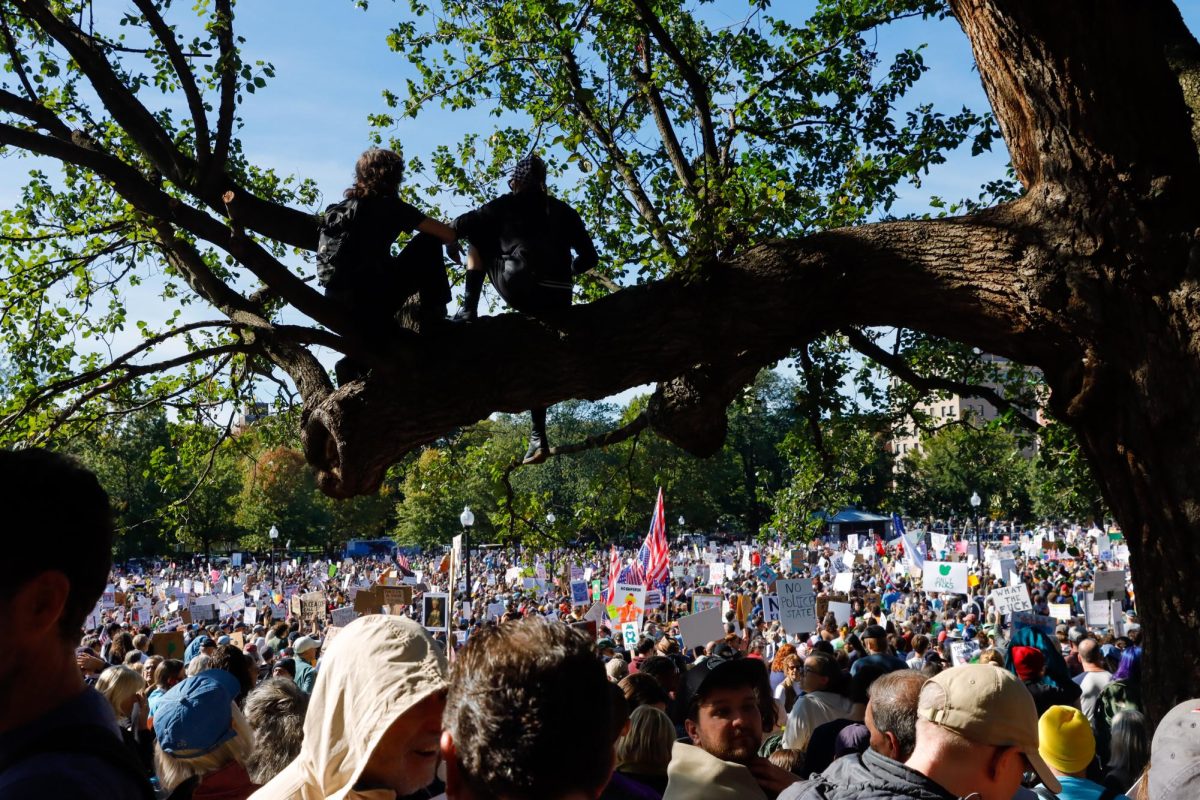
Boston’s demonstration is among the second wave of nationwide protests coordinated by the No Kings organization. These demonstrations aim to criticize the “authoritarian” policies of the Trump administration, such as allowing ICE’s aggressive tactics, attempts to change mail-in voting, and raising healthcare costs, the organization said. The first wave of protests occurred on June 14, Trump’s birthday, and attracted over 5 million people across the country.
According to the event website, No Kings Day was ‚Äúnot a typical rally,‚Äù as it focused on providing information about how to get involved locally and encouraged creative resistance.¬Ý
On the Parade Grounds of the Common, the main stage drew a large crowd with speakers and musical performances. The rally was emceed by Rahsaan Hall, president and CEO of the Urban League of Eastern Massachusetts.
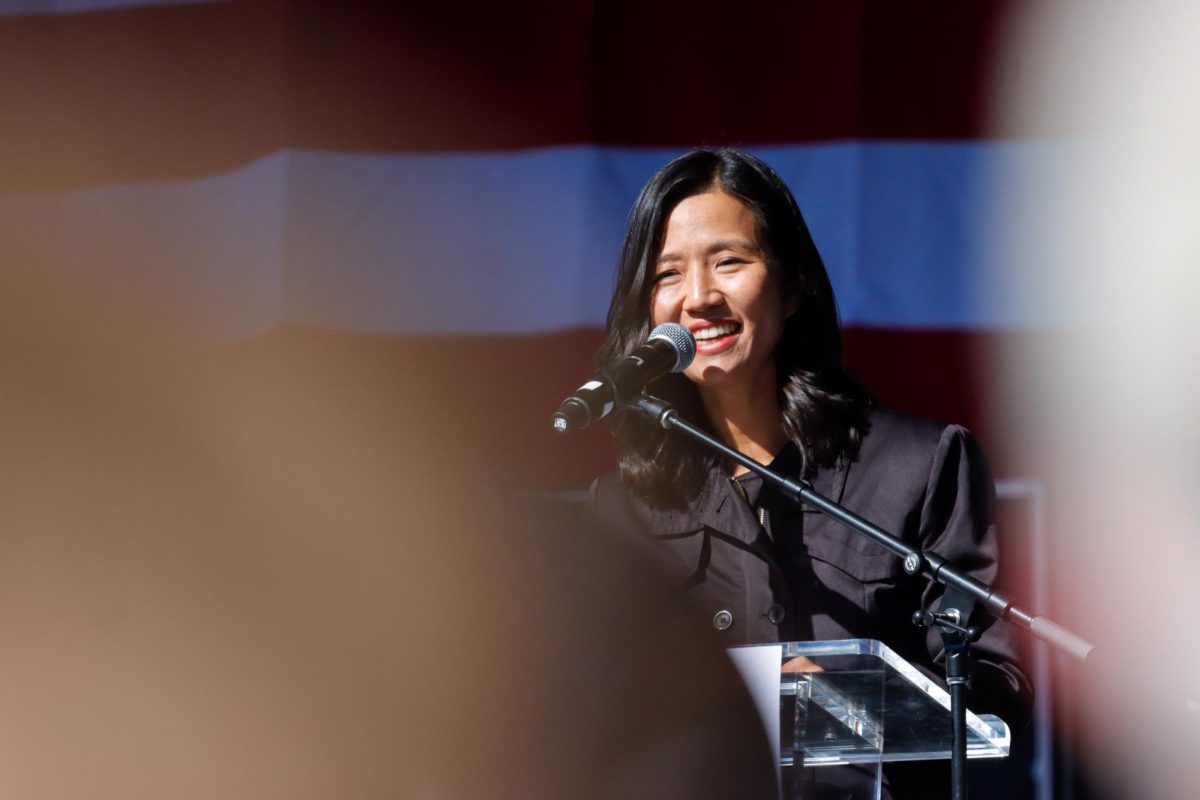
Toward the beginning of the protest, Mayor Michelle Wu addressed the Trump administration’s recent threats to Boston. Last Tuesday, the president claimed that parts of the city had been ‚Äútaken over‚Äù by unrest. Such claims have led some to worry that Trump may move to deploy the National Guard in Boston, as he has done in other Democratic-led cities across the country, including Portland and Chicago.
‚ÄúWhat scares them most about Boston is that we are proof of the America they insist is impossible. Where diversity and creativity fuel progress and opportunity,‚Äù Wu said.¬Ý
As Wu spoke, a small group of protesters wearing keffiyehs and waving Palestinian flags began to yell over her, calling her a ‚Äúliar.‚Äù The mayor has been criticized by pro-Palestinian activists for¬Ý not taking a clear stance on the Israel-Palestine conflict, and her response to protests in the city.¬Ý
‚ÄúThis is Boston, where every voice is heard,‚Äù Wu said in response to the disruption. Hall addressed Wu‚Äôs protesters after the mayor finished her speech.¬Ý
‚ÄúThis is what democracy looks like,‚Äù he said. ‚ÄúWe‚Äôre gonna have a dissenting opinion even within the movement‚Ķ If we can‚Äôt tolerate disruption within the midst of our own disruptive protest, we‚Äôre doing it wrong.‚Äù¬Ý
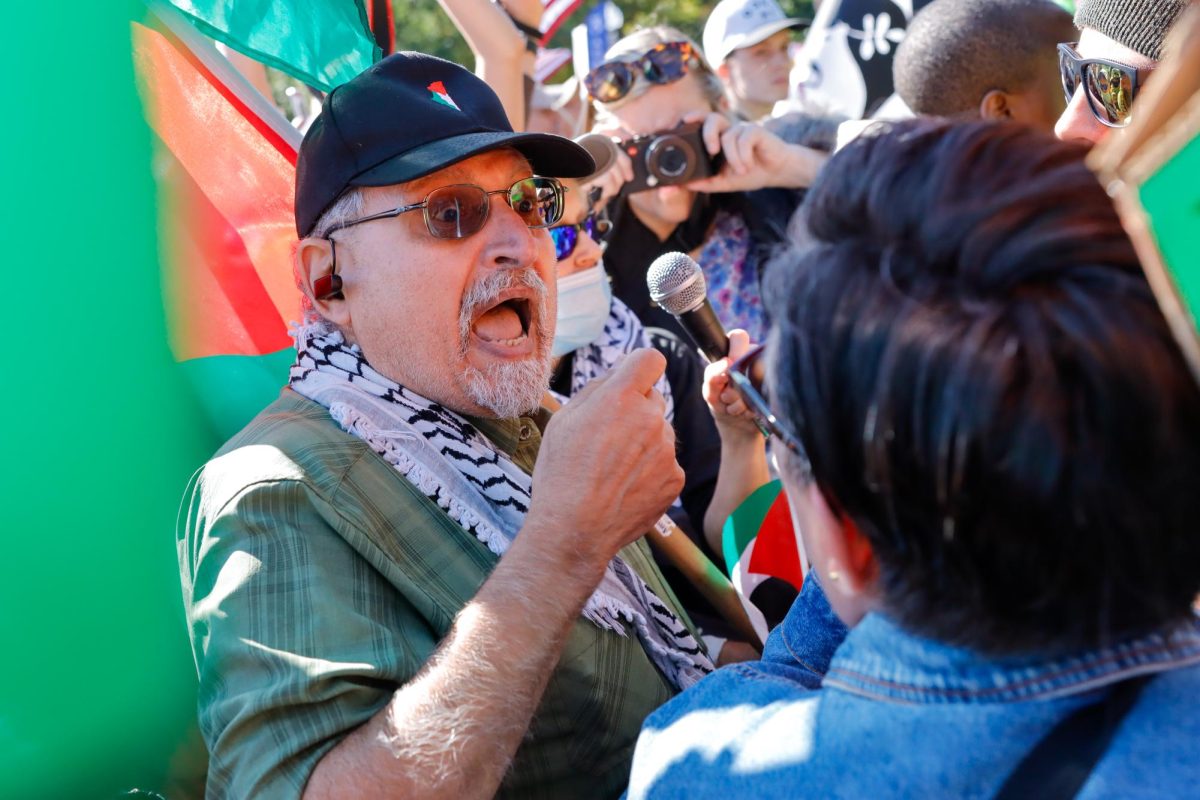
Fawaz Abusharkh, one of the founders of the Boston Coalition for Palestine and one of the individuals at the barricade in front of the stage, said the group attended the protest to hold the politicians speaking accountable.¬Ý
Abusharkh expressed particular disdain for Attorney General Andrea Campbell, who also spoke during the rally due to the charges levied against 13 people who were arrested, including four Emerson students, on Oct. 7 in Downtown Boston. All 13 protesters have new charges of inciting a riot, and 7 have additional charges of anarchy. Abusharkh compared the Boston Police Department to the Gestapo, the police force during Nazi Germany.¬Ý¬Ý
“We’re out here because our politicians come and lie to us to our face. Michelle Wu, who just sent her Gestapo to arrest Emerson students last week, is coming to talk about ‘no kings,’” he told The Beacon. “No king is no king, including Michelle Wu.”
Other politicians present were Senators Elizabeth Warren and Ed Markey, and Representatives Ayanna Pressley, Katherine Clark, and Seth Moulton. The same group of protestors and other attendees around them booed and yelled similar criticisms at the politicians during their speeches.¬Ý
Between speakers representing organizations like the Massachusetts Temporary Protected Status Committee and the Massachusetts Communities Action Network, multiple music groups played songs, inviting the crowd to dance and respond with messages of resistance. Behind the bandstand, more than 20 community organizations had tables where they shared resources with attendees.
Corporate Accountability, a Boston-based advocacy organization, held a vote for a ‚ÄúCorporate Hall of Shame,‚Äù an annual tradition, according to the organization‚Äôs website, where corporations Tesla, Chevron, Wells Fargo, GEO, Philip Morris International, and Lockheed Martin are included on this year‚Äôs ballot.¬Ý
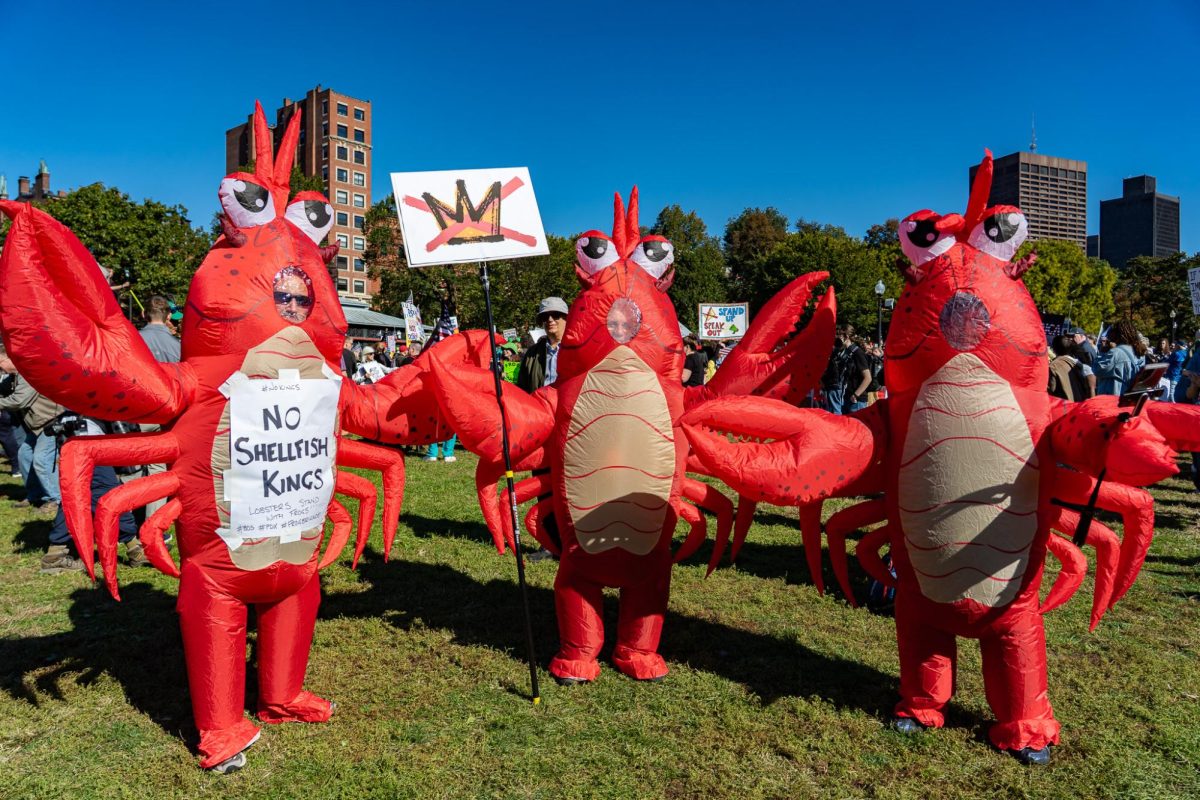
‚ÄúThe Trump regime represents corporate takeover of the United States ‚Ķ where many corporations have been lining up to prop up this regime to profit from it,‚Äù said Ari Rubenstein, Corporate Accountability‚Äôs communications director. ‚ÄúWe’re building a world where corporations answer to people, not the other way around.‚Äù
Movement Voter Project (MVP) is a national organization that combines community organizing and electoral advocacy to bring about change. Janet Selcer, a local MVP organizer, emphasized that the organization works with marginalized communities that have felt ‚Äúpushed aside.‚Äù¬Ý
‚ÄúOnce people are part of an organization and are successful [in] changing something, they realize that there is strength in numbers and they’re much more willing to get involved,‚Äù Selcer said.
Many protestors felt a sense of duty to join the gathering to protest against Trump.
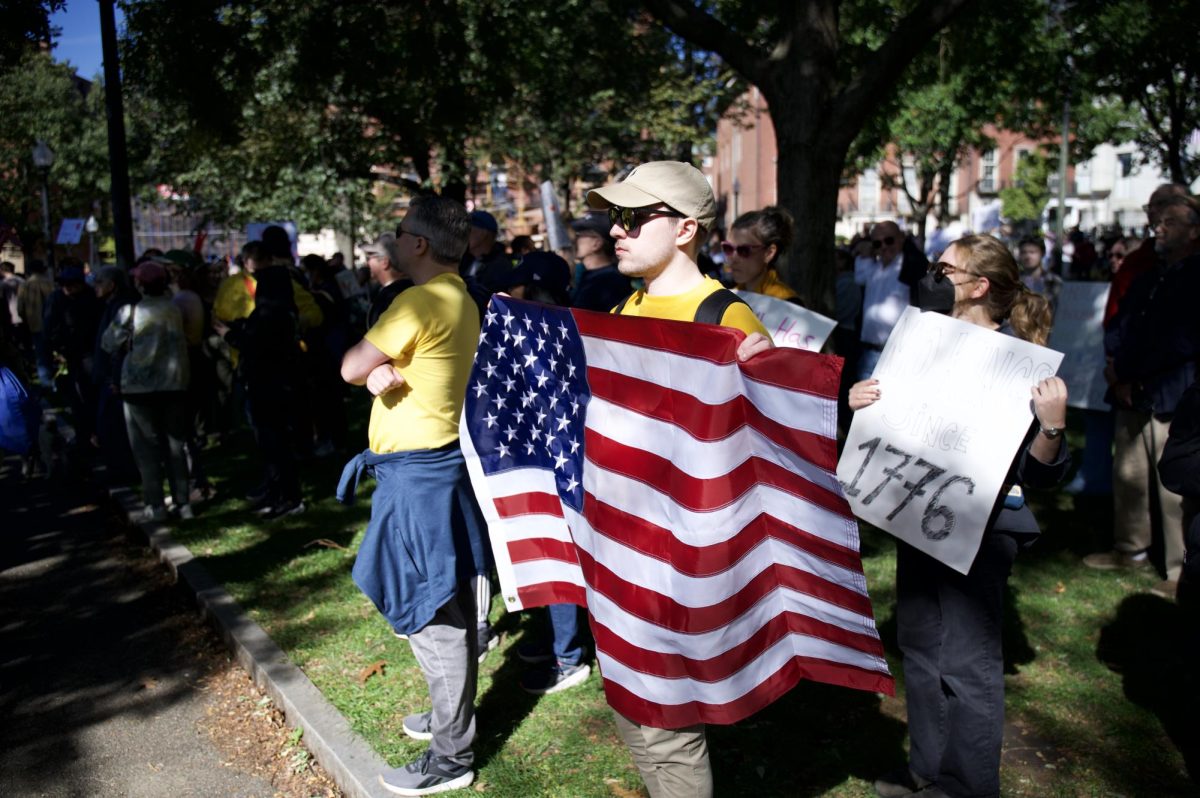
Dana R., a Boston resident who did not provide a full last name for privacy reasons, waved an American flag during the protests. She said this was to refute Speaker of the House Mike Johnson’s statement that the No Kings Day demonstrations were ‚Äúhate America‚Äù rallies.
‚ÄúThis is something I’ve been trying to do for years, is trying to take back the flag. They don’t own it,‚Äù Dana said. ‚ÄúWhat we’re doing here is the essence of patriotism ‚Ķ and I chose to bring [the flag] to show that we’re patriots too.‚Äù
Beacon Staff Sage Jezierski and Jules Telfort contributed to this report.